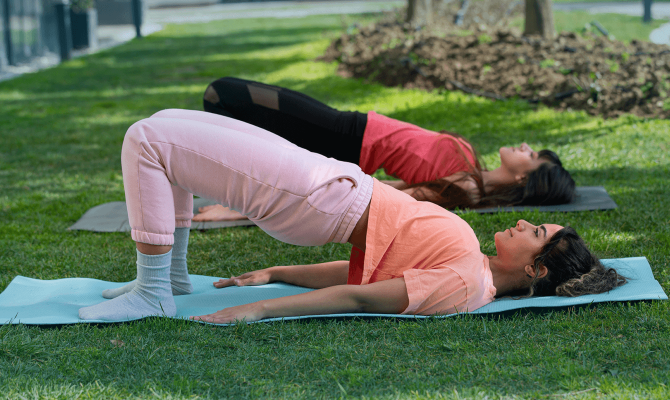What is Pelvic Floor Dysfunction?
15 Sep 2025
11 Nov 2022

Habit Health Senior Physiotherapist, Heather Hickey, took a keen interest in pelvic floor physiotherapy after she got pregnant because it gave her the confidence to talk about the changes that can happen before and after pregnancy. Heather helps demystify the connection between physio and pelvic health from pregnancy to menopause.
There are a few areas we can help with. We treat incontinence, which is the loss of bladder or bowel control. Most commonly, we treat urinary incontinence, which can happen because of weakness or damage to the pelvic floor muscles and/or connective tissues.
Some conditions or activities put people at a higher risk of pelvic floor dysfunction because they place a greater load or strain on the pelvic floor. Some of these are: pregnancy, multiple births, obesity, straining from constipation, chronic coughing or vomiting, high-impact physical activities, surgery, or trauma.
We also treat those with pelvic pain following trauma or from sporting conditions. Pelvic health physiotherapy can also be effective to address sexual dysfunction, including pain with sex or the inability to maintain an erection or achieve orgasm.
One great measure is to ensure you have good toileting habits and aren’t straining when passing a bowel movement.
Before giving birth, we also recommend seeing a pelvic physiotherapist. This can give you an opportunity to prepare yourself for the birth, consider the load that the child is putting on your pelvic floor and educate yourself on steps you can take to rehabilitate and re-engage in physical activity safely after giving birth.
For those nearing menopause, fluctuations in hormone levels can affect our pelvic floor function through changes in muscle and connective tissue, vaginal lining, and lubrication. Getting an internal pelvic exam gives insights into your strength, atrophy or drying. This gives a guide to possible treatments to help manage any concerns.
Getting your routine smear checked also helps make sure any abnormalities are caught and addressed.
For those who gave birth on or after 1 October 2022, ACC provides support for the care of several maternal birth injuries: including a variety of perineal tissue tears, muscle detachments, injury from obstetric instruments, nerve injuries, uterine injuries, prolapses, bony fractures and joint or ligament tears.
It all can sound a bit scary, but there are plenty of experts like us who can help you through these injuries.
This includes care from a variety of medical and allied health providers, such as a pelvic health physiotherapist, a physiotherapist, a medical practitioner, a nurse practitioner, a nurse, a midwife, an osteopath, and a chiropractor.
We start by reviewing a person’s medical history and understanding their pelvic health concerns and any symptoms. We also conduct a visual and manual assessment of the pelvic floor where needed, and this may include an internal examination via either the vagina or anus. This helps make sure we create a thorough treatment plan.
When we have all the information we need, we educate the client on the normal functioning and role of the various structures in the pelvic basin because, as with any part of the body, this can be pretty complex to understand. We make sure to break things down so they’re easy for our clients to understand. Then, we provide an explanation for the symptoms they’re experiencing.
The rehabilitation programme always includes education and can also include home exercises, the use of a diary to monitor the person’s concerns, strategies to assist with toileting, mindfulness or urge control techniques, and if needed, a referral to a medical expert, dietician, or other health provider.
If you are pregnant, we recommend pelvic floor muscle strengthening and perineal massage (stretching the exit of the birth canal) to prevent injury and aid in post-partum recovery.
If you’ve recently given birth, remember that with time and the right rehabilitation and support team, you can safely get back to physical activity and regain control of your bowel and bladder. While it’s common to have trouble with bladder and bowel control following childbirth, experts can help get this under control.
Pelvic Health Physiotherapy is available to these clinics:
Urinary incontinence is no laughing matter. Talk to one of our pelvic health physiotherapists for information on our new femfit® by JUNOFEM pelvic floor training system.